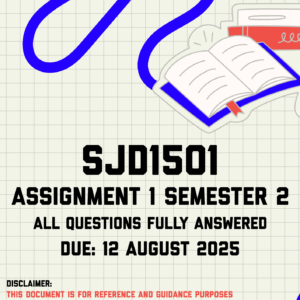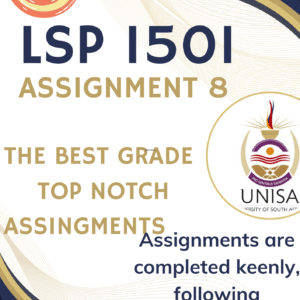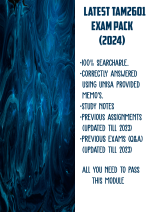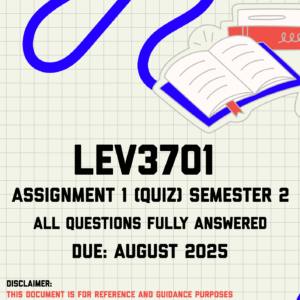Description
MTE1501 Assignment 2 Memo | Due 12 June 2025. 2 Essays provided. Answer both scenarios below. Scenario 1: Reflecting on the Nature of Mathematics and Teaching (Essay Response) You are a student teacher invited to speak at a community education seminar about the importance of mathematics. In preparing for this event, you begin to reflect on what mathematics really is, why it matters in society, and how this understanding will influence your approach to teaching mathematics. You recall your studies in Unit 1 about the nature and history of mathematics and Unit 2’s insights into learning and teaching mathematics effectively. Task (Essay Response, approx. 600–800 words, 25 marks): Write a reflective essay discussing the nature of mathematics, its role in society, and how this perspective influences effective mathematics teaching and learning. Your essay should demonstrate insight from Units 1 and 2. In your response, be sure to address the following points (in an integrated essay format, not short answers): • What is Mathematics? Provide your understanding of the nature of mathematics. Consider definitions or descriptions (for example, mathematics as a human activity involving pattern-seeking, problem-solving, and logical reasoning, not just memorization of rules). • Mathematics in Society: Discuss the role and significance of mathematics in society and everyday life. Why is mathematics essential for individuals and communities? Include a brief example from the history or development of mathematics in a cultural context (e.g., an ancient civilization or cultural group from Unit 1) that illustrates how mathematics emerged to solve real-world problems or meet societal needs. • Implications for Teaching: Reflect on how your view of mathematics will shape your teaching practice. Considering what you learned in Unit 2, explain how understanding the true nature of mathematics (as more than rote calculation) will influence how you plan lessons and engage learners. For instance, how will you foster meaningful learning and conceptual understanding in your classroom? How will you help students see mathematics as relevant to their lives and encourage a positive attitude toward math? Your essay should be written in an academic tone, with a clear introduction and conclusion. Support your reflections with key concepts from Unit 1 and Unit 2. (25 marks) Scenario 2: Bridging Procedural Knowledge and Conceptual Understanding (Structured Short-Answer Questions) You are teaching a mathematics lesson to a Grade 6 class. During a practice exercise, you notice one of your students, Thabo, can correctly solve an arithmetic problem using the formula you taught in class. However, when you ask Thabo to explain his reasoning or apply the same concept to a slightly different real-life situation, he struggles and cannot articulate why his method works. It becomes clear that while Thabo can perform the procedures by rote, he lacks a deeper conceptual understanding of the mathematical idea. You realize this is a common challenge in mathematics education – students often learn how to do something without understanding why it works. Task (Structured Questions, 25 marks total): Refer to the scenario above and answer the following questions. Write a short paragraph for each sub-question. Use concepts from Unit 1 and Unit 2 to support your answers. Label each answer (a, b, c, etc.): (a) Conceptual vs Procedural Knowledge: Explain the difference between procedural knowledge and conceptual understanding in mathematics learning. In the scenario context, which type of knowledge has Thabo demonstrated, and which is he lacking? (5 marks) (b) Instrumental vs Relational Understanding: Describe what is meant by “instrumental understanding” and “relational understanding” (as discussed in Unit 2). Which of these describes Thabo’s current understanding of the material? Why is relational understanding considered a more desirable learning outcome in mathematics education? (5 marks) (c) Improving Understanding – Teaching Strategies: Suggest one instructional strategy or teaching approach you (as the teacher) could use to help Thabo and the rest of the class develop a better conceptual (relational) understanding of this mathematical topic. Describe your suggested approach and explain how it would help students move beyond rote procedures to understanding the “why” behind the math. (5 marks) (d) Mathematics in Real-Life Contexts: Connect this classroom scenario to the broader importance of mathematics in real life. Why must students develop a deep understanding of mathematical concepts (not just the ability to calculate) when applying mathematics in everyday situations or society? Provide one example of how purely procedural knowledge might fail a person in a real-life context, and how conceptual understanding would help. (5 marks) (e) Addressing Beliefs about Mathematics: Often, students (and even some adults) believe that “mathematics is just about memorizing formulas and rules” or that you “either have a mathematics brain or you don’t.” Based on what you learned in Unit 1, discuss how such beliefs can affect learners’ approach to mathematics. How can teachers help change this perception to encourage a more positive, growth-oriented mindset toward learning mathematics? (5 marks)
































Reviews
There are no reviews yet.